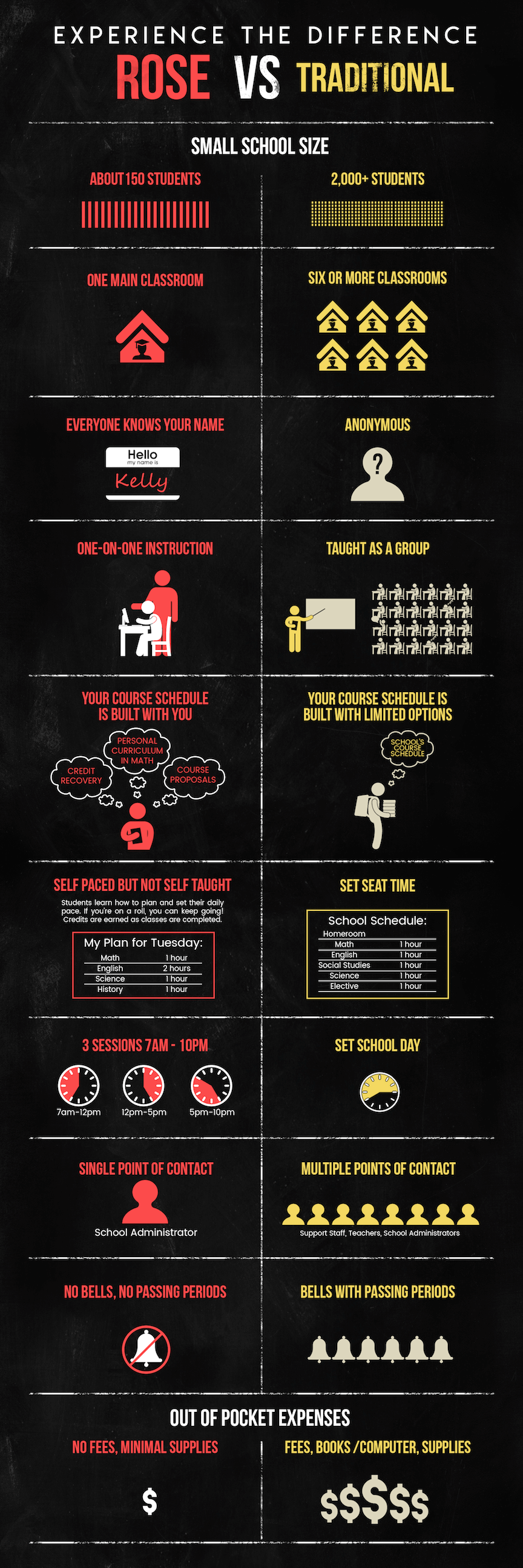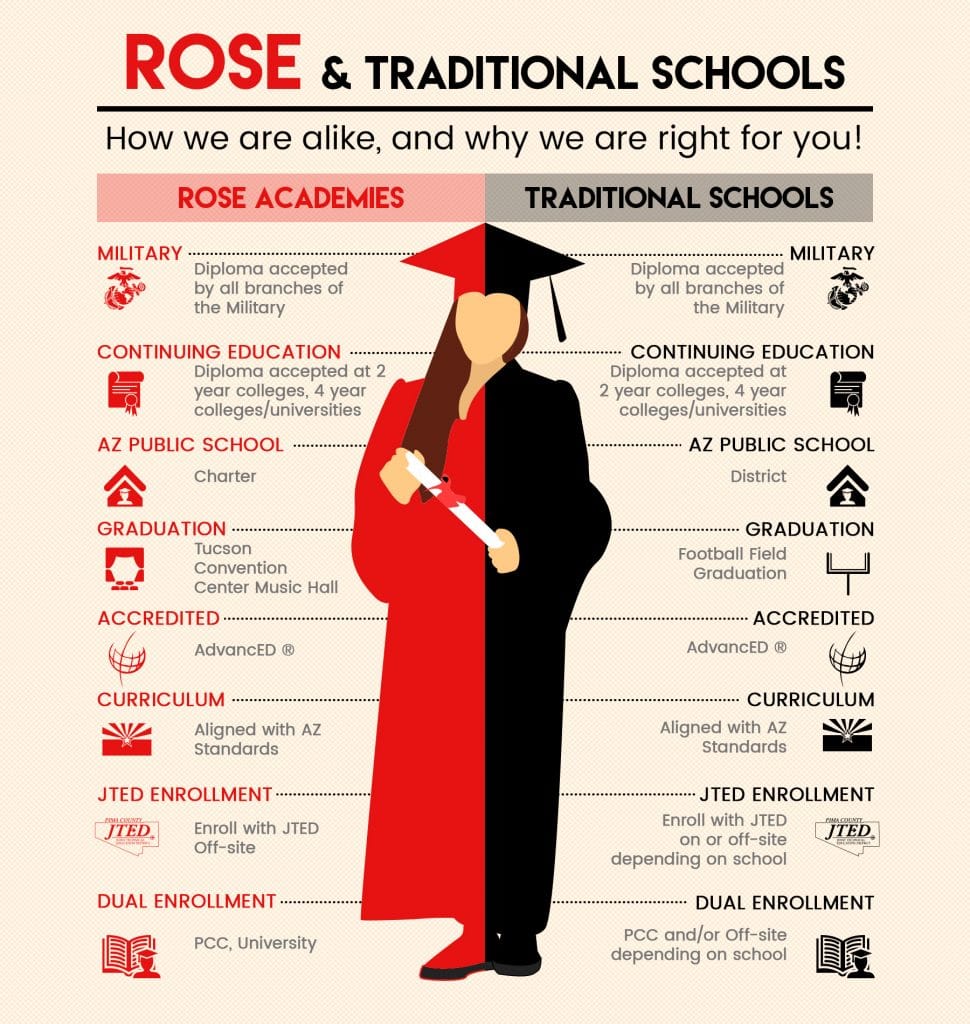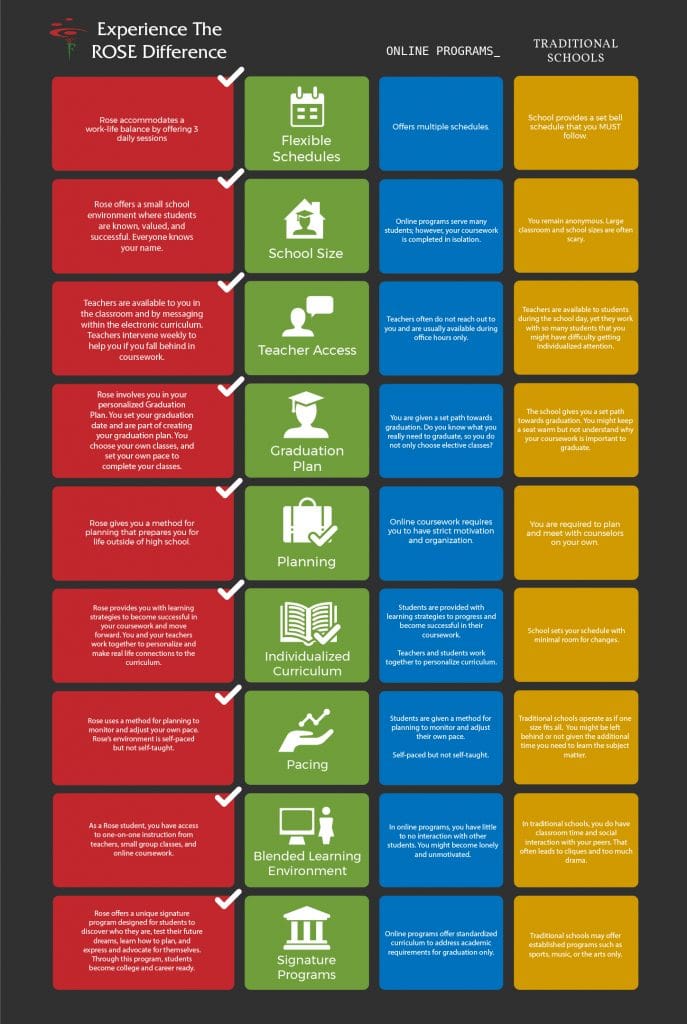
Pros and Cons of Charter Schools: Should Your Child Attend?
Every parent wants their child to succeed academically, but choosing the right learning environment can feel overwhelming. In this article, we’ll explore the pros and cons of charter schools so you can make an informed decision about your child’s education.
We’ll discuss what sets charter schools apart—from their flexibility and smaller class sizes to challenges like funding limitations. With insights from Rose Academies, you’ll gain a better understanding of whether a charter school aligns with your child’s learning style and educational needs.
To learn more about the unique benefits of charter schools, contact Rose Academies today. We’ll discuss your child’s needs and learning preferences to determine whether our Arizona charter schools would be the best for their future.

Pros of Attending Charter School
Charter schools break away from the one-size-fits-all learning model of traditional public schools. With more flexibility, smaller class sizes, and a focus on individualized learning, they help students feel supported and engaged:
Enhanced Flexibility
Unlike traditional public schools, charter schools have the freedom to design their curriculum to better meet students’ needs. Instead of rigid, state-mandated programs, many charter schools offer innovative learning experiences, hands-on projects, and real-world applications. Whether your child thrives in STEM programs, creative arts, or career-focused pathways, charter schools provide a learning structure tailored to their strengths.
Smaller Class Sizes for Personalized Learning
In a crowded classroom, students may struggle to get the attention they need. Charter schools typically have smaller class sizes, allowing teachers to connect with students on a more personal level. This individualized attention helps students ask questions, stay engaged, and build confidence in their abilities.
Higher Academic Standards
Charter schools operate under performance-based contracts, so they must meet strict academic benchmarks. Many charter schools hold students to high academic standards, providing a challenging and enriching educational experience that fosters critical thinking and problem-solving skills.
Strong Community & Parental Involvement
Charter schools encourage parental involvement in decision-making, school events, and academic progress. If you value your involvement in your child’s education—through volunteering, attending school meetings, or having a voice in school policies—a charter school may be the right choice for your family.
Alternative Education for Different Learning Needs
Not every student thrives in a traditional public school setting. Many charter schools cater to unique learning needs with credit recovery programs, individualized learning plans, and specialized tracks in fields like science, arts, or vocational training. If your child benefits from a personalized learning approach, a charter school could be the perfect fit.

Cons of Attending Charter School
While charter schools offer many benefits, they aren’t the right choice for every family. It’s important to consider the limitations of charter school before making a decision for your child.
Variability in Quality
Charter schools operate independently, so the quality of education, teacher experience, and school culture may vary widely from one school to another. While some charter schools offer strong academic programs and supportive environments, others may struggle to meet expectations. It’s important to research individual schools to ensure they align with your child’s educational needs and future goals.
Limited Accessibility
Unlike traditional public schools, which guarantee enrollment based on your location, charter schools have limited seats. Some use a lottery system for admissions, so not every student is guaranteed placement. If demand is high, long waitlists can pose a challenge for students who need immediate placement.
Financial Limitations
Although charter schools receive public funding, they often operate on smaller budgets than traditional public schools. This can result in fewer extracurricular activities, limited special education services, or older facilities. While many charter schools in Arizona use their resources effectively, it’s best to ensure the school offers the programs and support your child needs to succeed.
Teacher Turnover
Some charter schools experience higher teacher turnover than traditional public schools due to salary structures, job demands, or administrative policies. For students who thrive on consistency, frequent staff changes can be disruptive. Researching a school’s teacher retention rate can provide insight into its faculty stability.
Potential Lack of Diversity
Student demographics at charter schools don’t always reflect the diversity of local communities. Some schools naturally attract students with specific academic interests or backgrounds, which may result in less cultural and social diversity. If exposure to a wide range of perspectives is important for your family, researching a school’s student demographics can ensure an inclusive environment.

How to Choose the Right Charter School
Every charter school has its own unique strengths, culture, and academic approach, so it’s important to evaluate your options to ensure a positive experience for your child.
Here are some important factors to consider when choosing a charter school:
- Academic Performance & Curriculum: Review test scores, graduation rates, and college acceptance rates. Does the school’s curriculum support your child’s learning style and future aspirations?
- Class Sizes & Student Support: Smaller class sizes typically mean more personalized attention. Ask about teacher-to-student ratios, tutoring options, and counseling services.
- School Culture: Visit the school and talk to teachers and parents to get a feel for the environment. Does it seem like a place where your child will feel welcomed and supported?
- Extracurricular Activities: Does the school offer sports, arts, clubs, or other programs aligned with your child’s interests? A well-rounded experience can be just as important as academics.
- Parental Involvement: Some charter schools encourage active parental participation. If this matters to you, ask about opportunities to engage in school events, committees, or decision-making.
- School Policies & Discipline Approach: Review policies regarding attendance, dress codes, behavior expectations, and discipline to ensure they align with your family’s values.
- Teacher Stability & Experience: High turnover rates can affect student learning and school culture. Check the school’s teacher retention rate and support systems for educators.
- Accessibility & Transportation: Consider location, commute times, and whether the school offers transportation options that fit your family’s schedule.
- Accountability & Accreditation: Charter schools must meet performance goals outlined in their contracts. Confirm whether the school meets academic benchmarks and is accredited by a recognized organization.
Learn More About How Your Child Can Thrive at Rose Academies
At Rose Academies, we believe every student deserves an education that meets their unique needs and helps them reach their full potential. With a supportive community, smaller class sizes, and flexible learning options, we create an environment where students don’t just learn—they thrive.
If you’re wondering whether a charter school is the right choice for your child, we’re here to help. Contact Rose Academies today to learn more about our schools and see how we can support your child’s success!